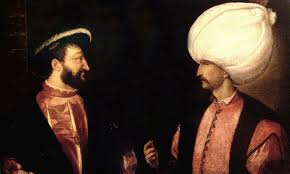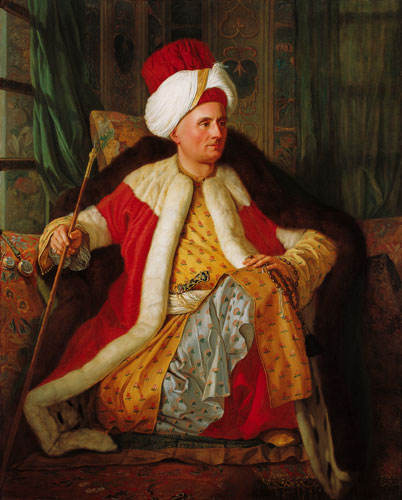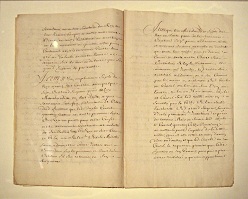(1).jpg)
FRANCE’S FRIENDSHIP DID NOT BRING PROSPERITY TO THE TURKS
The ancient friend and ally France has also been a source of inspiration for the reforms carried out in Türkiye for the past two centuries. However, how good of an ally and how proper of an inspiration it was is debatable.
The Ottoman Empire was forced to change its centuries-old closed-off way of life at the beginning of the 19th century. European merchants were spreading across Ottoman lands. Successive defeats compelled contact with Europe, which demonstrated superiority in military matters.

The architect of the Ottoman-French alliance in a sense, King Francis I and Sultan Suleiman I
Why Europe? Why France?
For the reform of institutions, a source of inspiration is always needed. A system deemed superior is taken as a model. The same was true for the Ottomans. Europe was emulated not because it was better, but because it was stronger. It was imitated not out of admiration but out of necessity. The words of Grand Admiral Halil Pasha express this sentiment: “If we do not hasten to imitate Europe, we will be forced to retreat to Asia!”

The French ambassador in Ottoman attire
The Tanzimat (Reorganization) reformists had before them four of Europe's most powerful states as models: England, France, Austria, and Russia. Among these, France was chosen. Everything was restructured from top to bottom according to this model. But why was France, a national state, preferred over Austria, Russia, or England, which were empires more similar to the Ottoman Empire in terms of hosting diverse populations?
.jpg)
Sultan Ahmed III receiving the French ambassador
France had long-standing friendly relations with the Ottoman Empire. It was an enemy of Germany, which was also the enemy of the Ottomans. The principle of “The enemy of my enemy is my friend” created a closeness between the two countries. Sultan Selim III admired France’s military victories. It is said that he corresponded with the King of France even before ascending the throne. In fact, since the fragmentation of Europe worked in its favor, Istanbul was the first to recognize the revolutionary government. French officers were brought in to train the newly forming Ottoman army in the European style. At that time, even Napoleon—then just an ordinary artillery officer and later the future emperor—applied to be among these military advisors but was ultimately held back to suppress a royalist uprising.
.jpg)
Sultan Selim III
Even France’s military landing in Egypt and its later encouragement of the Egyptian governor's rebellion did not break this friendship. Napoleon's transformation of France into the world's most powerful state through authoritarian and centralized reforms dazzled Istanbul. In the eyes of reformists, France was the best example. French became the lingua franca (the language of diplomacy), spreading everywhere; speaking French, and especially visiting Paris, was regarded as a mark of high intellect, leading to the hiring of French governesses in households.
Hoca Tahsin Efendi’s famous couplet captures this sentiment: "Go to Paris a day early if you have any sense at all; Those who have not been to Paris cannot be counted as having lived!" Those with foresight warned of this “French affliction,” but their words went unheeded. France embraced the Young Turks, and opposition publications against the regime found a home in Paris. France consistently pursued a duplicitous policy against the Sublime Porte (Ottoman government). It was willing to do anything to establish a foothold in the Middle East. The same is true even today.
.jpg)
Napoléon Bonaparte
A Poor Imitation
Rather than bringing in foreign instructors, Sultan Mahmud II preferred, like the Governor of Egypt Mehmed Ali Pasha, to send students to France. From 1827 onward, students were sent to France, where they learned the French language and culture in depth and became familiar with its political and social institutions. Naturally, upon their return, they acted according to this model. The French government also easily exerted influence over them. The admiration of Ali and Fuad Pashas for France was legendary. Even Reşid Pasha, despite being an admirer of the British, took France as a model in his actions. France, which established laicism in its own country, posed as the protector of Ottoman Christians and pressured the Sublime Porte on this issue. Consequently, Ottoman law, administration, and education became poor copies of the French system. The republicans took this even further.


Two copies of capitulation decrees (The upper one dated 1536, the lower one dated 1569)
The British, considering their own culture unfit for others, did not concern themselves with imposing it. France, on the other hand, was different. It loved to present itself as the cradle of Western civilization. Moreover, England was not well known in the Ottoman Empire. British democracy did not suit the interests of bureaucrats who established their own authoritarian rule in the country. Austria, which was perhaps the most suitable model due to its centralized imperial structure, was avoided partly because of old hostilities. The Austrian Prime Minister Metternich even advised the Sublime Porte to avoid imitating others and to act in accordance with its own national structure. As for Russia, which had started modernizing 150 years earlier, the Ottomans saw it as a crude and uncultured Eastern power.
Was the Choice Correct?
The French system functioned excellently within its own context. But the Ottoman Empire was not France. Thus, reforms modeled after France always caused problems. The political, judicial, financial, and educational systems of Türkiye have remained poor imitations of the French model. Even today, many of the problems in Türkiye’s systems stem from this. Grand Vizier Prince Said Halim Pasha remarked in 1919: "We took France as the basis for reforming our system. However, French society bore no resemblance to ours; its origins, essence, mindset, customs, traditions, knowledge, and level of civilization were vastly different from ours, and its needs were many and varied. The perfection of the French system attracted us, and we deemed this sufficient for adopting it. However, no one considered whether this system was suitable for a country like ours, which bore no resemblance to France. It is no surprise that after so many years of effort, these reforms have yielded almost no results."
Over time, France adapted its system through reforms, making it compatible with its evolving structure. Unfortunately, this could not be achieved in Türkiye. Even France softened its laicism. Sarkozy openly stated that laicism had not benefited humanity and that religion posed no harm. Today, thousands of students are educated in Catholic schools, and priests walk the streets in their robes. However, those who took France as a model still cling to outdated principles. If reforms were inevitable and a system had to be taken as a model, choosing the British model—due to its similarity to the Ottoman system—might have provided long-term benefits.
Önceki Yazılar
-
WOMAN IN THE EASTERN WORLD11.02.2026
-
THE OTTOMAN DYNASTY OWES ITS LIFE TO A WOMAN4.02.2026
-
THE WATER OF IMMORTALITY IN THE “LAND OF DARKNESS”28.01.2026
-
THE WORLD LEARNED WHAT FORBEARANCE IS FROM SULTAN MEHMED II21.01.2026
-
THE RUSH FOR GOLD14.01.2026
-
TRACES OF ISLAM IN CONSTANTINOPOLIS7.01.2026
-
WHO CAN FORGIVE THE KILLER?31.12.2025
-
WHEN WAS PROPHET ISA (JESUS) BORN?24.12.2025
-
IF SULTAN MEHMED II HE HAD CONQUERED ROME…17.12.2025
-
VIENNA NEVER FORGOT THE TURKS10.12.2025